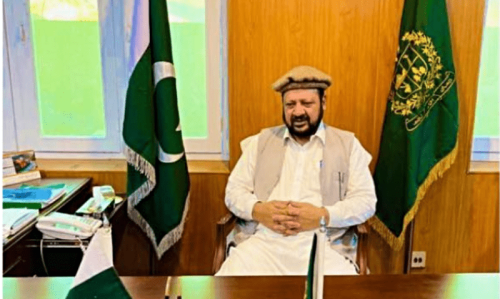GILGIT: The month-long sectarian strife in Gilgit-Baltistan finally came to an end on Thursday after religious leaders belonging to the two opposing sides issued a joint declaration, vowing to help the regional government in the maintenance of law and order in the GB region.
In the first week of September, the government suspended internet services and ramped up security measures in the wake of protests after two clerics from different schools of thought made insensitive remarks, hurting the feelings of the respective communities, and fuelling unrest.
The government had claimed that the army was only summoned on the occasion of chehlum. On Sept 19, the internet services were restored, indicating that the situation had started to improve. However, in the absence of a definite statement, the controversy had not completely settled.
After three days of deliberation, religious leaders from Diamer, Baltistan, and Gilgit agreed to support the government in keeping law and order in the region.
Religious leaders vow to support govt in maintaining law and order
Delegations from both sects called on Chief Minister Gulbar Khan at the CM Secretariat in Gilgit. Following the meeting, CM Khan along with his cabinet members and the clerics’ delegations talked to the media.
“A peaceful environment is the need of every citizen, and without peace, we cannot bring development to the region,” the CM said, adding that due to the support of the religious leaders, the month-long uncertainty in GB had come to an end.
Earlier, GB Home Minister Shams Lone and Chief Minister’s Special Assistant for Information Iman Shah along with two dozen clerics from Baltistan, Gilgit, and Diamer said the GB government was fulfilling its full responsibility for maintaining peace in GB.
“Peace and stability in Gilgit-Baltistan is a need and a collective responsibility of all schools of thought,” the home minister said.
Joint declaration
A joint declaration issued on the occasion said that the recent religious uncertainty has been settled after the joint efforts of the religious scholars and the CM. It said the GB government had the support of law enforcement agencies and religious leaders.
The joint declaration said the writ of government has been restored and the false and baseless propaganda of the “enemy state has been given a resounding reply”. “The religious leaders played their role in enforcing the state law and controlling the religious sentiments in the communal tension, the GB government appreciates this spirit,” the declaration said.
The declaration said it is reiterated that the “representatives of all religious leaders are present here to validate these measures and after that, if any group or evil elements try to disturb the peaceful atmosphere of GB, the state and government will deal it with its full powers”.
Law and order directives
Separately, Chief Secretary Mohyuddin Ahmed Wani chaired a meeting on law and order and issued directives to all divisional and district administrative heads and law enforcement agencies to maintain law and order.
All administrative and police heads at the divisional and district levels are instructed to convene regular meetings in collaboration with intelligence agencies to effectively coordinate and detect any presence of “illegal aliens or foreigners within their respective jurisdictions”.
The statement said the Home Department will collaborate with the police to establish a dedicated unit to monitor social media for hate speech, anti-state sentiments, and content against institutions. Swift and decisive action will be taken in case of violations. Any attempts to disrupt health and educational facilities will be met with strict consequences.
“The Karakoram Highway (KKH) and the Jaglot-Skardu Road (JSR) are to remain accessible under all circumstances. Necessary measures must be taken by all relevant authorities to ensure their uninterrupted operation,” it added.
Published in Dawn, October 6th, 2023



































